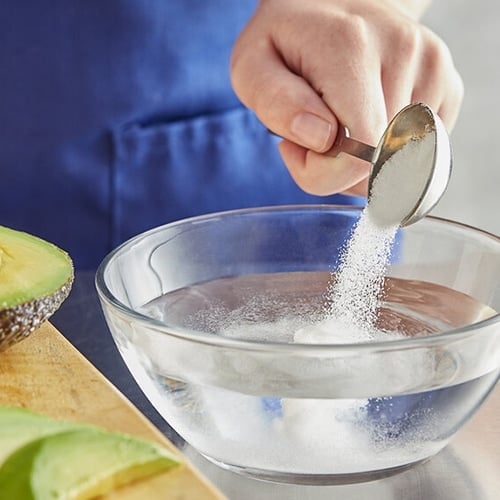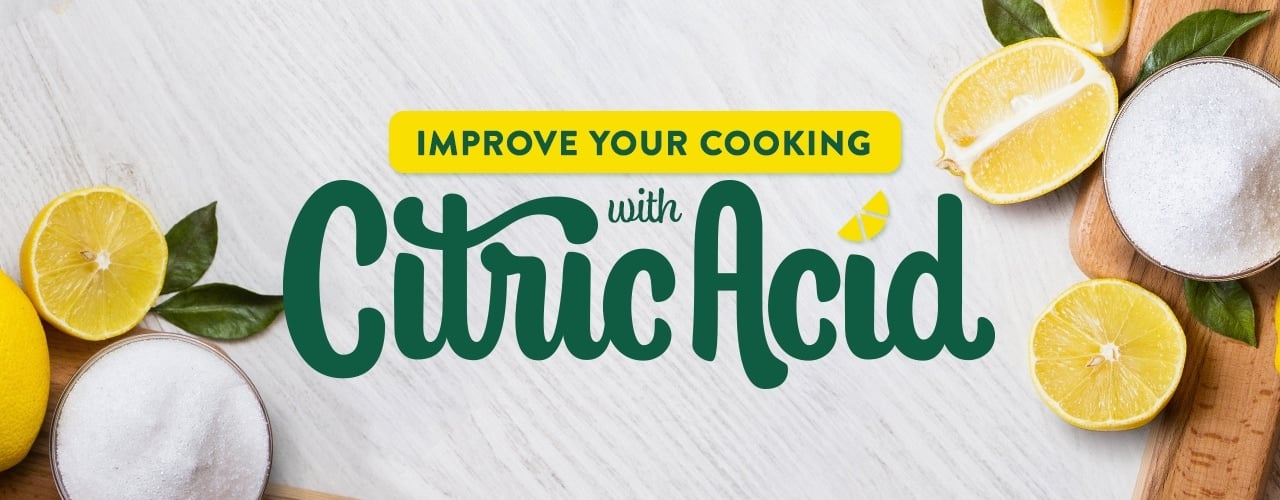Citric Acid: Why It Makes Your Cooking Better
Last updated on Jan 14, 2026Michale LeRoyCitric acid powder is a secret weapon that can improve your baking, enhance the flavors of your dishes, and keep your seasonal fruits and veggies fresh. With so many uses, why isn’t citric acid more well known? Check out the ingredients list on many processed foods and you’ll find that citric acid is a common additive. But outside of food manufacturing, chefs are just beginning to discover that citric acid is a powerhouse ingredient and a valuable cooking staple.
What Is Citric Acid?

Citric acid is a crystalline white powder used in cooking to add sour flavor or adjust the acidity of a dish. This ingredient is widely available and commonly used in food manufacturing as a preservative, but it also has many kitchen uses that we'll reveal below.
What Is Sour Salt?
Sour salt is another name for citric acid. Many call citric acid by the nickname sour salt because it looks like salt and has a texture comparable to grains of salt. The similarities end there because citric acid has no salty flavor. As noted by the name, sour salt tastes sour and acidic.
What Is Citric Acid Used For?
Citric acid is a food-safe preservative and additive in many processed foods like beverages, snacks, and sour candies. What many don’t realize is citric acid powder is also a highly versatile kitchen staple. Citric acid provides many benefits that can improve your baking, cooking, and preserving. Keep reading to learn more about citric acid powder uses:
Citric Acid For Cooking
Experienced cooks know how important acid can be when it comes to balancing out the flavors of a dish. Acidic flavor provides depth, counteracts bitterness, and complements the other taste sensations that humans are able to experience. The five tastes are sweet, sour, salty, bitter, and umami flavor. Without the sour flavor of acid to round these out, some dishes can fall flat.
Enter citric acid, a shelf-stable, powdered additive that is bursting with sour flavor. Citric acid powder is unique because it’s one of the few ways to add acid to a dish without also increasing the moisture or liquid content. A twist of fresh citrus juice or a splash of vinegar are common methods of adding sour flavor, but sometimes liquid-based ingredients will change the dish too much. Here are the benefits of working with citric acid powder in your cooking:

- Easy to Measure and Control - Powdered citric acid is easy to measure and can be sprinkled on dishes a little at a time. Every cook has experienced the woes of over-souring their dish with too much vinegar. Citric acid makes it easy to control the acidity level in your cooking so it's just right.
- Contains No Liquid - Citric acid provides sour flavor without increasing the moisture content of dishes. Sometimes you need to add acid without any liquid.
- Neutral Sour Flavor - Citric acid provides pure acidity with no other flavors. Vinegar and wine have their own distinct flavors in addition to their sour profile, which doesn’t suit every dish.
- Affordable - Other sour additives, like the exotic spice amchoor, are not as affordable or readily available as citric acid, which can be purchased in bulk and has a long shelf life.
Citric Acid For Baking
Acids play an important role in baking by adding tart flavor and can actually affect the chemical reactions that occur during the baking process. Lemon juice, vinegar, and acidic dairy ingredients like buttermilk are trusted baking ingredients for these reasons, but citric acid powder is an economical substitute.
- Leavening - When citric acid is combined with baking powder, a chemical reaction occurs and carbon dioxide gas bubbles are created. This helps to improve the leavening, or rise, of baked goods. Citric acid is a helpful substitute in vegan baking that cannot rely on eggs or buttermilk to help with leavening.
- Bread Making - Citric acid can be used as a shortcut method to add extra tangy flavor to homemade bread. If you don’t have access to a sourdough starter or your starter is too young to have developed the complex flavor you’re looking for, adding a pinch of citric acid will do the trick.
- Improves Flavor - Getting enough citrus flavor into baked goods can sometimes be a challenge, and bakers often rely on extracts that provide bursts of flavor without the added liquid of citrus juice. Lemon cookies, lemon squares, and the British tea time favorite, lemon drizzle cake, can all benefit from the use of citric acid to create a balance between sweet and tart.
Preserving With Citric Acid

Because citric acid increases the pH or acidity level of foods, it works well as a preservative. It can be sprinkled on cut fruits and vegetables to keep them looking fresh or used in canning to create the ideal acidic environment. Lemon juice or vinegar can add too much liquid, which makes dry citric acid powder a convenient alternative.
- Canning Tomatoes - On their own, canned tomatoes are not acidic enough to prevent bacteria growth. Additional acid needs to be introduced into the jar to ensure a safe acidity level. Because tomatoes also have a high water content, citric acid powder is the best way to add acidity without adding liquid.
- Prevents Oxidation - A large bowl of guacamole can turn brown very quickly, and using lemon or lime juice to preserve the bright green color can make the dip too watery. Sprinkle citric acid powder over the guacamole to keep it looking fresh.
Other Citric Acid Powder Uses
- Sprinkle citric acid powder over cut apples to preserve their color
- Use citric acid in the cheese-making process to curdle milk
- Add citric acid to spice blends for a tangy kick
- Combine citric acid powder with salt for rimming margaritas and other cocktails
- Use citric acid in pickling vegetables or canning jams and jellies
Where Does Citric Acid Come From?
Citric acid was originally derived from lemon juice, but during the 1900s a more affordable method for manufacturing citric acid was discovered. As unusual as it sounds, most citric acid powder now comes from fermenting a strain of fungi called Aspergillus niger. The mold is fed a diet of sugar, and as the sucrose is metabolized, citric acid is produced as a by-product. This method is much more economical than using citrus fruits and allows for citric acid powder to be produced on a larger scale.
Citric Acid vs Lemon Juice
Lemons are one of the most concentrated sources of naturally occurring citric acid, but lemon juice and citric acid are not the same thing. The difference between citric acid and lemon juice is that citric acid is a concentrated acid compound, while lemon juice contains citric acid, water, vitamin C, and other molecules. Lemon juice also has nutritional value, but citric acid contains no nutrients and very few calories.
Citric acid is extremely useful in the kitchen because it's affordable, it can be purchased in bulk, and it has a long shelf-life. Consider stocking up on this versatile ingredient and keeping a shaker nearby while you're cooking. A touch of citric acid powder can be the secret ingredient you need to brighten your dishes and bring all the flavors together!



